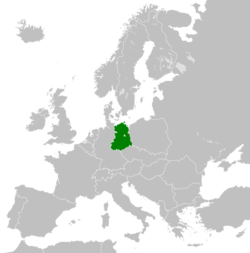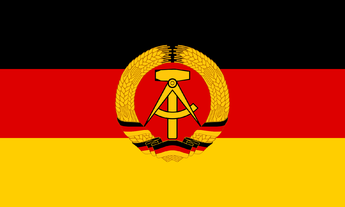Difference between revisions of "East Germany"
Jump to navigation
Jump to search
(Redirected page to German Democratic Republic) Tag: New redirect |
|||
| (One intermediate revision by one other user not shown) | |||
| Line 1: | Line 1: | ||
| − | + | {{nation state | |
| + | |wikipedia=https://en.wikipedia.org/wiki/East_Germany | ||
| + | |description=Former country in [[Europe]]. | ||
| + | |subgroups=Stasi | ||
| + | |location=Europe | ||
| + | |capital=Berlin | ||
| + | |historycommons= | ||
| + | |logo=1920px-Flag of the German Democratic Republic.svg.png | ||
| + | |logo_width=345px | ||
| + | |map=East Germany 1956-1990.svg.png | ||
| + | |leaders= | ||
| + | |sourcewatch= | ||
| + | |wikiquote= | ||
| + | }} | ||
| + | '''East Germany''', officially the '''German Democratic Republic''', (GDR) is a former country that existed from [[1949]] to [[1990]], the period when the eastern portion of Germany was part of the [[Eastern Bloc]] during the [[Cold War]]. Commonly described as a [[communist]] state in English usage, it described itself as a socialist "workers' and peasants' state"<ref>Patrick Major, Jonathan Osmond, The Workers' and Peasants' State: Communism and Society in East Germany Under Ulbricht 1945–71, Manchester University Press, 2002, ISBN 978-0-7190-6289-6</ref>.It consisted of territory that was administered and occupied by [[Soviet]] forces following the end of [[World War II]] — the Soviet occupation zone of the [[Potsdam Agreement]], bounded on the east by the Oder–Neisse line. The Soviet zone surrounded [[West Berlin]] but did not include it and West Berlin remained outside the jurisdiction of the GDR. | ||
| + | {{SMWDocs}} | ||
| + | |||
| + | ==References== | ||
| + | {{reflist}} | ||
| + | {{stub}} | ||
Latest revision as of 11:16, 2 September 2021
 | |
 | |
| Capital city | Berlin |
| Location | Europe |
| Type | |
| Subgroups | Stasi |
| Former country in Europe. | |
East Germany, officially the German Democratic Republic, (GDR) is a former country that existed from 1949 to 1990, the period when the eastern portion of Germany was part of the Eastern Bloc during the Cold War. Commonly described as a communist state in English usage, it described itself as a socialist "workers' and peasants' state"[1].It consisted of territory that was administered and occupied by Soviet forces following the end of World War II — the Soviet occupation zone of the Potsdam Agreement, bounded on the east by the Oder–Neisse line. The Soviet zone surrounded West Berlin but did not include it and West Berlin remained outside the jurisdiction of the GDR.
Related Quotation
| Page | Quote | Author | Date |
|---|---|---|---|
| Ulla Jelpke | “While anti-communists of all stripes are foaming at their mouths on the further demonization of East Germany and in particular of the Stasi, extensive sober scientific studies and documentation of its Foreign Intelligence Directorate (HVA) have emerged in recent years. One does not have to share each of HVA's assessments. But it must be recognized that hardly any other secret service has been so comprehensively dealt with historically by its own former employees and spies as the GDR's foreign intelligence. Many of you were sentenced to imprisonment for your courageous work for peace after the end of East Germany. The spies of the BND - an aggressive imperialist service built up by old Nazis -, on the other hand, went unpunished for their operations against socialism. This unequal treatment is an outrageous injustice to this day, which also throws a significant understanding of the so-called "democratic constitutional state", which the informers from the BND and the Federal Office for the Protection of the Constitution allegedly defend.” | Ulla Jelpke | 2010 |
Citizens of East Germany on Wikispooks
| Title | Born | Died | Description |
|---|---|---|---|
| Bärbel Bohley | 24 May 1945 | 11 September 2010 | East German opposition figure and artist. |
| Rainer Wiegand | 1996 |
Many thanks to our Patrons who cover ~2/3 of our hosting bill. Please join them if you can.
References
- ↑ Patrick Major, Jonathan Osmond, The Workers' and Peasants' State: Communism and Society in East Germany Under Ulbricht 1945–71, Manchester University Press, 2002, ISBN 978-0-7190-6289-6